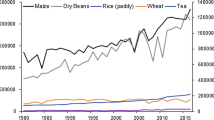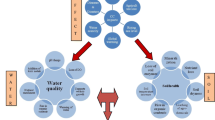Abstract
Climate change is expected to have important consequences for sugarcane production due to global warming, changes in precipitation patterns, and changes in the frequency of extreme weather events. A key application of crop growth simulation models is to help understand and predict the effects of and interactions between, climate, soil, and management on crop yield. This study aimed to simulate climate change's impact on potential sugarcane yield in 11 representative locations over the sugarcane areas of Réunion Island from 2015 to 2066 using the Mosicas sugarcane crop growth model. High spatial resolution climate data for the future were obtained from the Building Resilience in the Indian Ocean project conducted by the French National Weather Service. It includes temperature and precipitation under three scenarios of the IPCC. Results showed that, despite a favorable increase in temperature, the change in precipitation patterns resulted in an average reduction in sugarcane yield by 6% in 2050 compared to the current period. Nonetheless, the impact of climate change was largely variable depending on climatic areas in the island. It was much larger at low altitudes on the West Coast (− 15%) than at high altitudes (− 4% on average). Additionally, the probability of low yields will increase even if the average was little impacted. In future research, different adaptive management scenarios will be explored to reduce the impact of climate change, particularly the change in irrigation management and harvest periods. This approach will be expanded to consider a broader view of the climate variability in the island.

Source: ASP 2016 from IGN; production: Cirad AIDA, 2024


Similar content being viewed by others
Data Availability
The data that support the findings of this study are available on request from the corresponding author.
References
Chandiposha, M. 2013. Potential impact of climate change in sugarcane and mitigation strategies in Zimbabwe. African Journal of Agricultural Research 8: 2814–2818.
Cheeroo-Nayamuth, F.C., M.J. Robertson, M.K. Wegener, and A.R.H. Nayamuth. 2000. Using a simulation model to assess potential and attainable sugar cane yield in Mauritius. Field Crops Research 66: 225–243. https://doi.org/10.1016/S0378-4290(00)00069-1.
Christina, M., M.-R. Jones, A. Versini, M. Mézino, L. Le Mézo, S. Auzoux, J.C. Soulié, C. Poser, and E. Gérardeaux. 2021. Impact of climate variability and extreme rainfall events on sugarcane yield gap in a tropical Island. Field Crops Research 274: 108326. https://doi.org/10.1016/j.fcr.2021.108326.
Deressa, T., R. Hassan, and D. Poonyth. 2005. Measuring the impact of climate change on South African agriculture: The case of sugarcane growing regions. Agrekon 44: 524–542. https://doi.org/10.1080/03031853.2005.9523726.
Doorga, Jay Rovisham Singh. 2022. Climate change and the fate of small islands: The case of Mauritius. Environmental Science & Policy 136: 282–290. https://doi.org/10.1016/j.envsci.2022.06.012.
Farooq, Nageen, and Shabbir H. Gheewala. 2020. Assessing the impact of climate change on sugarcane and adaptation actions in Pakistan. Acta Geophysica 68: 1489–1503. https://doi.org/10.1007/s11600-020-00463-8.
Gawander, J. 2007. Impact of climate change on sugar-cane production in Fiji. WMO Bulletin 56: 34–39.
Goldemberg, José, Francisco F. C. Mello, Carlos E. P. Cerri, Christian A. Davies, and Carlos C. Cerri. 2014. Meeting the global demand for biofuels in 2021 through sustainable land use change policy. Energy Policy 69: 14–18. https://doi.org/10.1016/j.enpol.2014.02.008.
Jones, M.R., A. Singels, and A.C. Ruane. 2015. Simulated impacts of climate change on water use and yield of irrigated sugarcane in South Africa. Agricultural Systems 139: 260–270. https://doi.org/10.1016/j.agsy.2015.07.007.
Knox, J.W., J.A. Rodriguez Diaz, D.J. Nixon, and M. Mkhwanazi. 2010. A preliminary assessment of climate change impacts on sugarcane in Swaziland. Agricultural Systems 103: 63–72. https://doi.org/10.1016/j.agsy.2009.09.002.
Leal, Manoel Regis L. V., Luiz A. Horta Nogueira, and Luis A. B. Cortez. 2013. Land demand for ethanol production. Applied Energy 102: 266–271. https://doi.org/10.1016/j.apenergy.2012.09.037.
Leroux, Marie Dominique, François Bonnardot, Stephason Kotomangazafy, Philippe Veerabadren, Abdoul Oikil Ridhoine, Samuel Somot, Antoinette Alias, and Fabrice Chauvin. 2021. Regional climate projections and associated climate services in the southwest Indian Ocean basin: EGU21-7029. https://doi.org/10.5194/egusphere-egu21-7029
Leung, Julie. 2015. Le modèle agricole réunionnais résiste: l’emploi et les surfaces exploitées se stabilisent. 95. DAAF La Réunion.
Linnenluecke, Martina K., Natalie Nucifora, and Nicole Thompson. 2018. Implications of climate change for the sugarcane industry. Wiley Interdisciplinary Reviews-Climate Change 9: e498. https://doi.org/10.1002/wcc.498.
Linnenluecke, Martina K., Clara Zhou, Tom Smith, Nicole Thompson, and Natalie Nucifora. 2020. The impact of climate change on the Australian sugarcane industry. Journal of Cleaner Production 246: 118974. https://doi.org/10.1016/j.jclepro.2019.118974.
Marin, Fabio R., James W. Jones, Abraham Singels, Frederick Royce, Eduardo D. Assad, Giampaolo Q. Pellegrino, and Flávio. Justino. 2013. Climate change impacts on sugarcane attainable yield in southern Brazil. Climatic Change 117: 227–239. https://doi.org/10.1007/s10584-012-0561-y.
Martiné, Jean-François., Pierre Siband, and Raymond Bonhomme. 2007. Simulation of the maximum yield of sugar cane at different altitudes: Effect of temperature on the conversion of radiation into biomass. Agronomie 19: 3–12. https://doi.org/10.1051/agro:19990101.
Pipitpukdee, S., W. Attavanich, and S. Bejranonda. 2020. Climate change impacts on sugarcane production in Thailand. Atmosphere 11: 408. https://doi.org/10.3390/atmos11040408.
R Development Core Team. 2020. R: A Language and Environment for Statistical Computing. Vienna, Austria: R Foundation for Statistical Computing.
Ruan, Hongyan, Puyu Feng, Bin Wang, Hongtao Xing, Garry J. O’Leary, Zhigang Huang, Hao Guo, and De Li. Liu. 2018. Future climate change projects positive impacts on sugarcane productivity in southern China. European Journal of Agronomy 96: 108–119. https://doi.org/10.1016/j.eja.2018.03.007.
Santos, Dayana L. dos., and Paulo C. Sentelhas. 2012. Climate change scenarios and their impact on the water balance of sugarcane production areas in the State of São Paulo, Brazil. Revista Ambiente & Água 7: 07–17. https://doi.org/10.4136/ambi-agua.907.
Singels, Abraham, Matthew Jones, Fabio Marin, Alexander Ruane, and Peter Thorburn. 2014. Predicting climate change impacts on sugarcane production at sites in Australia, Brazil and South Africa using the Canegro model. Sugar Tech 16: 347–355. https://doi.org/10.1007/s12355-013-0274-1.
Singh, Bhawan, and Mustapha El Maayar. 1998. Potential impacts of greenhouse gas climate change scenarios on sugar cane yields in Trinidad. Tropical Agriculture, 75: 348–353.
Sonkar, Geetika, Nidhi Singh, R. K. Mall, K. K. Singh and Akhilesh Gupta. 2020. Simulating the impacts of climate change on sugarcane in diverse agro-climatic zones of Northern India using CANEGRO-sugarcane model. Sugar Tech 22: 460–472. https://doi.org/10.1007/s12355-019-00787-w.
Spiertz, Huub. 2012. Avenues to meet food security. The role of agronomy on solving complexity in food production and resource use. European Journal of Agronomy 43: 1–8. https://doi.org/10.1016/j.eja.2012.04.004.
Trenberth, K.E., P.D. Jones, P. Ambenje, R. Bojariu, D. Easterling, A. Klein Tank, D. Parker, et al. 2007. Observations: Surface and atmospheric climate change. In Climate Change 2007: The Physical Science Basis. Contribution of Working Group 1 to the 4th Assessment Report of the Intergovernmental Panel on Climate Change, ed. S. Solomon, D. Qin, M. Manning, Z. Chen, M. Marquis, K.B. Averyt, M. Tignor, and H.L. Miller. Cambridge: Cambridge University Press.
Zhao, Duli, and Yang-Rui. Li. 2015. Climate change and sugarcane production: Potential impact and mitigation strategies. International Journal of Agronomy 2015: e547386. https://doi.org/10.1155/2015/547386.
Acknowledgements
We thank Meteo France for sharing the climate change projection from the BRIO Project.
Funding
Conseil Régional de La Réunion, the French Ministry of Agriculture and Food, the European Union (Feader program, Grant No. AG/974/DAAF/2016-00096 and Feder program, Grant No. GURTDI 20151501-0000735) and Cirad for funding, within the framework of the project “Compromis en Agriculture pour un Territoire Durable” (CAPTERRE).
Author information
Authors and Affiliations
Contributions
TV contributed to the writing-original draft; data curation; formal analysis; validation; and conceptualization. MM and LM were involved in the methodology and data curation. PT assisted in the supervision and validation. All authors contributed to writing-review and editing.
Corresponding author
Ethics declarations
Conflict of interest
There is no conflict of interest among authors while submitting the manuscript.
Additional information
Publisher's Note
Springer Nature remains neutral with regard to jurisdictional claims in published maps and institutional affiliations.
Rights and permissions
Springer Nature or its licensor (e.g. a society or other partner) holds exclusive rights to this article under a publishing agreement with the author(s) or other rightsholder(s); author self-archiving of the accepted manuscript version of this article is solely governed by the terms of such publishing agreement and applicable law.
About this article
Cite this article
Christina, M., Mézino, M., Le Mezo, L. et al. Modeled Impact of Climate Change on Sugarcane Yield in Réunion, a Tropical Island. Sugar Tech (2024). https://doi.org/10.1007/s12355-024-01372-6
Received:
Accepted:
Published:
DOI: https://doi.org/10.1007/s12355-024-01372-6




